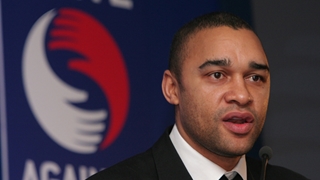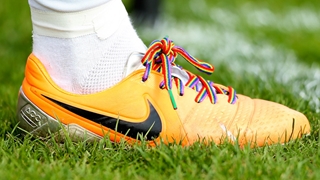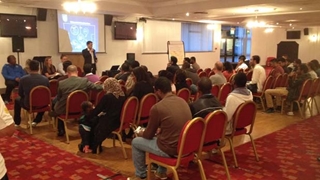
Paul Elliott has revealed his reasons for embarking on a three-decade campaign to battle discrimination in football.
In a heartfelt interview with TheFA.com, the former Chelsea, Aston Villa and Celtic defender said his determination to make a difference began in his teens.
It was 1983, and at the age of 18, Elliott was a regular for top-flight side Luton Town.
There he played alongside Brian Stein – and subsequently met the man who would affect his life forever.
Isaiah Stein – father to footballers Brian, Edwin and Mark – was a South African anti-apartheid activist.
He was the first figure in the struggle to be placed under 24-hour house arrest, in the same 1964 crackdown that resulted in Nelson Mandela being sent to Robben Island.
An associate and political ally of Mandela, Stein was frequently arrested and tortured by the police – and by the time he sought asylum in England his body was covered in scars.
“I met Brian Stein at Luton and I got to know Isaiah very well," said Elliott.
“We had many conversations about his life, his upbringing and the challenges he faced in South Africa.
“I couldn’t believe the suffering he experienced – what he stood up and fought for in South Africa at the time of the apartheid movement.
He continued: “It was a story that I found fascinating. It really moved me and what he and his children must have experienced had a profound effect on me.
“I knew then – coupled with the experiences that I’d had – that we had to campaign for equal rights and opportunities. It all started from the age of 18.”
Indeed, Elliott’s Luton Town days were to be life-changing for a number of reasons.
After starting his career at Charlton Athletic, he opted for the Bedfordshire club despite interest from Arsenal, and worked alongside another man who would have a lasting impact on his life.
“I met David Pleat and we sat down for hours to discuss his strategy and vision for the club – and how I could develop as a player,” he recalled.
“The most important thing, as I’ve always said when I’ve coached and worked with young players, is you go where you’re wanted.
"I was wanted there and I knew I had a future there. And that was one of the best moves of my career at such a very important time in my career.”
He may not have known at the time, but his decision to join the Hatters would also lead him into a life of activism.
Elliott spoke fondly of a game against Southampton when, in a time when racism was rife on the terraces, his side fielded seven black players.
"I felt a sense of protection and a level of comfort, but equally there was a level of exposure as well," he said.
In 1985 he also played in what became known as ‘The Kenilworth Road Riot’ – an FA Cup Sixth Round tie between Luton and Millwall in which fans clashed before, during and after the match.
It has been widely considered to be one of the worst examples of football hooliganism in the 1980s.
“That was horrific,” recalled Elliott. “I remember thinking that I’d never seen a game so out of control.
“There was a strong right-wing element that was very visible inside and outside stadiums, so I had those experiences from a very young age.”
According to Elliott, however, Luton was a club far ahead of the times – championed by the manager.
“Luton had such a diverse multicultural community and David was brilliant. He encouraged his players to go out into the roots of the community and really engage.

Pictured at the Britain's Best of Africa awards, Elliott has campaigned for equality for over 30 years
“He led from the front and wanted all his players to go out into the community. He understood that we were privileged and we could set an example and collectively as a football club make a difference.
“All the players – the black players, the white players, everybody – really embraced that mindset.”
Fast-forward 30 years and Elliott’s passion for the cause to which he has dedicated his adult life remains absolute.
He was an ambassador for England’s 2018 World Cup bid and chair of the Inclusivity Advisory Group. He has worked tirelessly with Kick It Out since its inception in 1993.
In 2012 he was awarded a CBE for services to equality and diversity in football.
This July Elliott joined The FA Inclusion Advisory Board – and although the game has moved on in the decades since he played, challenges still remain.
“We will all succeed together or all fail together”
Paul Elliott
“I don’t think anyone can question the progress made in the past 20 years,” he said.
“You’ve only got to look at the diversity now in the modern-day stadiums.
“You’ve got more women going to games, better access for disabled people – and more people from black and ethnic minority communities in crowds. And that's all reflective of the people that are playing on the pitch.
“Today however there are 21st-century challenges and they must be encapsulated by all our organisations.
“We will all succeed together or all fail together – and it is a challenge I am honoured to be associated with."











